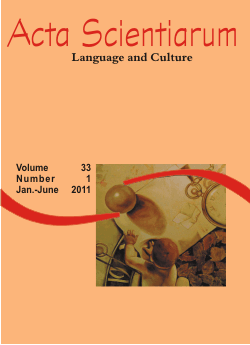<b>Latin-American Literature and national allegories present in the “novella” <em>Concierto Barroco</em></b> - doi: 10.4025/actascilangcult.v33i1.6376
Abstract
The problematical identity of Latin America is reflected on the recurrence of the theme in the literature created in this part of the continent. The images of Caliban and anthropophagy and the attribution of a Baroque meaning to the Latin American experience characterize an expressive part of such literature. By means of the character Amo, Carpentier's Concierto Barroco exemplifies the difficulties of the Creole elite in finding a noble origin for themselves in their ancestors' Europe, and in identifying themselves with it. The slave musician Filomeno and Amo naturalizes narrative, whereas Filomeno provocatively transits between the hierarchies, turning the Baroque meaning of identity into an allegory. Jazz is a Creole, anthropophagic and Baroque product whose erased origin was replaced by the fabled narrative in the Spirituals that renewed modern music. It is important to emphasize that Carpentier created, by means of Filomeno, the unity of the American experience whose frontier is Mexico.Downloads
DECLARATION OF ORIGINALITY AND COPYRIGHTS
I Declare that current article is original and has not been submitted for publication, in part or in whole, to any other national or international journal.
The copyrights belong exclusively to the authors. Published content is licensed under Creative Commons Attribution 4.0 (CC BY 4.0) guidelines, which allows sharing (copy and distribution of the material in any medium or format) and adaptation (remix, transform, and build upon the material) for any purpose, even commercially, under the terms of attribution.
Read this link for further information on how to use CC BY 4.0 properly.




















6.png)









